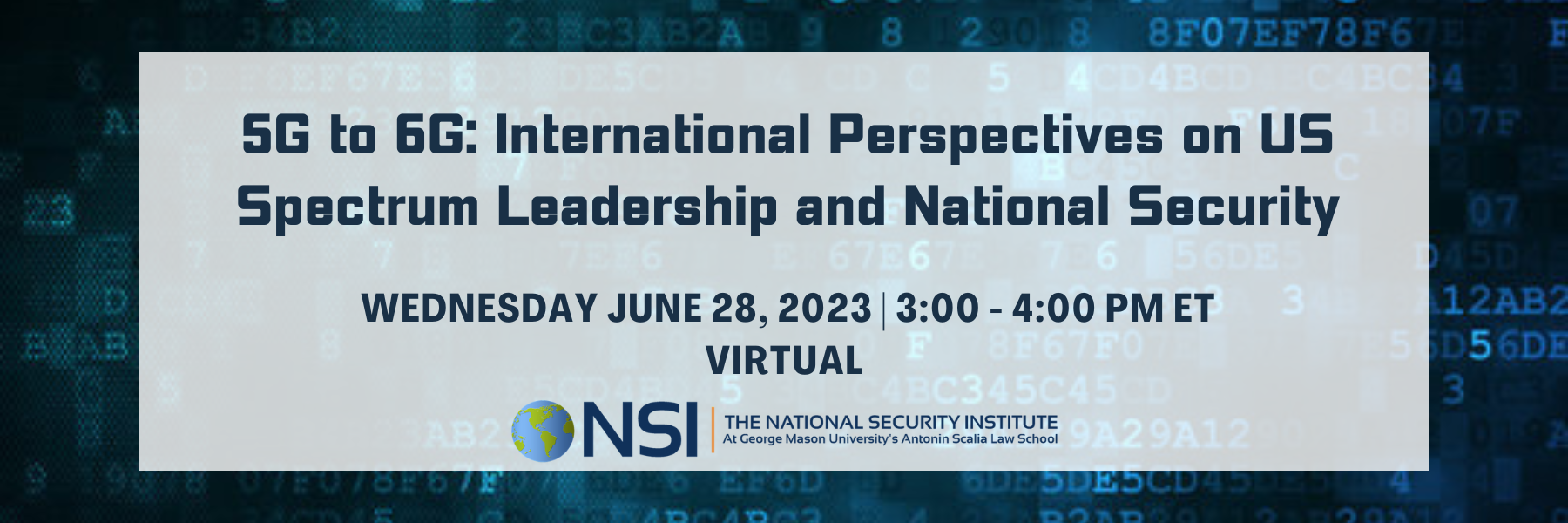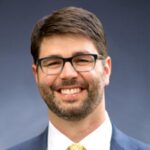
With this year’s World Radio Conference, the coming of 6G, and ongoing threats from China, NSI held a panel to learn about important lessons about security, innovation, and the wireless economy. While the US has led in 4G and 5G, the US experienced challenges globally with the proliferation of network products and services from untrusted vendors. The 6G standards development is already underway, but what is our strategy to deter and prevent malign influence in these networks, products, and services? What are the requirements for intelligence, regulatory oversight, and radio spectrum to defend our country and lead our allies abroad? This panel of US and EU wireless and defense experts discussed their thoughts.
Participants:
- Clete Johnson, Senior Fellow, Center for Strategic & International Studies (CSIS) Technologies Program
- Kim Kyllesbech Larsen, CEO, TechNEconomy
- Roslyn Layton, NSI Fellow and EVP, Strand Consult, & Founder, China Tech Threat
- Brent Skorup, Senior Research Fellow, Mercatus Center at George Mason University
- Jeffrey Wells, NSI Visiting Fellow and Partner, Sigma7
 Clete Johnson is a non-resident senior fellow with the CSIS Strategic Technologies Program. In this role, he directs the CSIS Fellowship for Advanced Cyber Studies Project, an initiative to train the next generation of cybersecurity leaders. He is a partner at Wilkinson Barker Knauer, LLP, in Washington, D.C. Mr. Johnson was most recently the senior adviser for cybersecurity and technology at the U.S. Department of Commerce, where he coordinated the department’s cybersecurity initiatives and support for the Commission on Enhancing National Cybersecurity. He was also the department’s representative for National Security Council staff deliberations on cybersecurity, encryption, and other policy issues at the intersection of technology and security. Previously, Mr. Johnson was appointed by the Federal Communications Commission (FCC) chairman as the FCC’s first chief counsel for cybersecurity. In that position, he helped develop the FCC’s cybersecurity mission, focusing on creating new legal mechanisms for government collaboration with private-sector stakeholders to improve the security and reliability of communications infrastructure.
Clete Johnson is a non-resident senior fellow with the CSIS Strategic Technologies Program. In this role, he directs the CSIS Fellowship for Advanced Cyber Studies Project, an initiative to train the next generation of cybersecurity leaders. He is a partner at Wilkinson Barker Knauer, LLP, in Washington, D.C. Mr. Johnson was most recently the senior adviser for cybersecurity and technology at the U.S. Department of Commerce, where he coordinated the department’s cybersecurity initiatives and support for the Commission on Enhancing National Cybersecurity. He was also the department’s representative for National Security Council staff deliberations on cybersecurity, encryption, and other policy issues at the intersection of technology and security. Previously, Mr. Johnson was appointed by the Federal Communications Commission (FCC) chairman as the FCC’s first chief counsel for cybersecurity. In that position, he helped develop the FCC’s cybersecurity mission, focusing on creating new legal mechanisms for government collaboration with private-sector stakeholders to improve the security and reliability of communications infrastructure.
 Kim Kyllesbech Larsen has over 20+ years of extensive international experience in the telecommunications industry, where he has held various national and international technology leadership positions. Throughout his career, Kim has been instrumental in architecting, building, and managing telecom networks and IT infrastructures across multiple regions worldwide. He has an in-depth understanding of cellular and fixed network architectures and expertise in the economics of technology evolution (e.g., 4G to 5G to 6G …) and disruptive potentials. Since the early 2000s, Kim has been a trusted advisor on technology and economics, specifically in spectrum strategy considerations and acquisition in the telecommunications sector worldwide, including the USA. His contributions have been invaluable in shaping telecom strategies in alignment with emerging technologies and market demands. With a Ph.D. degree in Physics and a master’s degree in Physics & Mathematics, Kim possesses a solid academic foundation. He owns TechNEconomY, an advisory firm specializing in Technology Economics and Strategy. Additionally, Kim holds various board positions within the telecommunications industry, offering deep expertise and an unwavering focus on maximizing the value of the relevant telecom and technology infrastructures.
Kim Kyllesbech Larsen has over 20+ years of extensive international experience in the telecommunications industry, where he has held various national and international technology leadership positions. Throughout his career, Kim has been instrumental in architecting, building, and managing telecom networks and IT infrastructures across multiple regions worldwide. He has an in-depth understanding of cellular and fixed network architectures and expertise in the economics of technology evolution (e.g., 4G to 5G to 6G …) and disruptive potentials. Since the early 2000s, Kim has been a trusted advisor on technology and economics, specifically in spectrum strategy considerations and acquisition in the telecommunications sector worldwide, including the USA. His contributions have been invaluable in shaping telecom strategies in alignment with emerging technologies and market demands. With a Ph.D. degree in Physics and a master’s degree in Physics & Mathematics, Kim possesses a solid academic foundation. He owns TechNEconomY, an advisory firm specializing in Technology Economics and Strategy. Additionally, Kim holds various board positions within the telecommunications industry, offering deep expertise and an unwavering focus on maximizing the value of the relevant telecom and technology infrastructures.
 Roslyn Layton, PhD is an international technology expert who explains the economics, security, and geopolitics of broadband. She is Senior Vice President of Strand Consult and Visiting Researcher at Aalborg University Copenhagen where she earned a doctorate in internet economics. She served on the Presidential Transition Team for the Federal Communications Commission (FCC). Roslyn founded the think tank China Tech Threat for policy to protect Americans’ privacy, security and prosperity from malicious technology produced by the People’s Republic of China. Her research examines cybersecurity, radio spectrum economics and security, business models for broadband cost recovery, and the security advantages of 5G versus Wi-Fi. Roslyn serves on the Program Committees of the International Telecommunications Society and the Telecom Policy Research Conference. She is a an advisor to the Foundation for American Innovation and the Krach Institute for Tech Diplomacy at Purdue. For more information, see RoslynLayton.com
Roslyn Layton, PhD is an international technology expert who explains the economics, security, and geopolitics of broadband. She is Senior Vice President of Strand Consult and Visiting Researcher at Aalborg University Copenhagen where she earned a doctorate in internet economics. She served on the Presidential Transition Team for the Federal Communications Commission (FCC). Roslyn founded the think tank China Tech Threat for policy to protect Americans’ privacy, security and prosperity from malicious technology produced by the People’s Republic of China. Her research examines cybersecurity, radio spectrum economics and security, business models for broadband cost recovery, and the security advantages of 5G versus Wi-Fi. Roslyn serves on the Program Committees of the International Telecommunications Society and the Telecom Policy Research Conference. She is a an advisor to the Foundation for American Innovation and the Krach Institute for Tech Diplomacy at Purdue. For more information, see RoslynLayton.com

Brent Skorup is a senior research fellow at the Mercatus Center at George Mason University. His research areas include transportation technology, telecommunications, and wireless policy. He served on the FCC’s Broadband Deployment Advisory Committee for four years. In addition to economics and law journal publication, he has authored pieces for Reuters, The Wall Street Journal, The New York Times, Wired, Bloomberg Law, and elsewhere. He’s appeared as a TV and radio interview guest for news outlets like C-SPAN, NPR, CBS News, ABC News, and CNBC Asia. Brent has a BA in economics from Wheaton College and a law degree from the George Mason University School of Law. He was a legal clerk at the FCC’s Wireless Telecommunications Bureau and at the Energy and Commerce Committee in the U.S. House of Representatives.
 Jeffrey Wells is a Partner at Sigma7, a risk services company, where he leads the Global Cyber Risk and Resilience practice. He has over 35 years of experience in leading cybersecurity engagements by leveraging existing infrastructure and talent, establishing effective cyber resilience strategies, commercializing cybersecurity technologies and ideas, and responding to immediate incidents and emerging cyber threats. He is responsible for defining critical risk management issues at the Board and Executive Management levels and providing tactical and operational level engagement to make a practical difference in risk understanding and enhanced resiliency outcomes. He has extensive experience advising and consulting with governments, global organizations, legal teams, venture, private equity, and angel investment organizations on cybersecurity-related strategies, including cyber-due diligence and the commercialization of cybersecurity technologies and ideas. Jeffrey is the Chief Security Officer for #AfghanEvac, a volunteer organization that brings together organizations with a shared commitment to fulfilling the United States’ duty to Afghan allies and friends. He is actively involved in offering cyber and contingency operations in Ukraine. He founded the Connected Warrior Foundation and served on the Boards of The Friends of the Light House Shelter, Valhalla Sailing Project, and A Fair Shake for Youth. He is a dedicated supporter of The Navy Seal Foundation, Travis Manion Foundation, Task Force Antal, the Special Operations Command Warrior Care Coalition, and the National Cryptological Foundation. He is a member of the Military Cyber Professionals Association, the OSS Society, and the Royal Overseas League. As a veteran of both Iraq and Afghanistan, he is a member and policy advocate for Iraq and Afghanistan Veterans of America. He is a Visiting Fellow at The National Security Institute (NSI) at George Mason University’s Antonin Scalia Law School. He is an alumnus of Colorado State University and Harvard University’s Kennedy School of Government and has certificates from several institutions, including the Massachusetts Institute of Technology, Harvard University, London School of Economics, Tel Aviv University, Oxford University, George Washington University School of Business, KTH Royal Institute of Technology, and the Aspen Institute.
Jeffrey Wells is a Partner at Sigma7, a risk services company, where he leads the Global Cyber Risk and Resilience practice. He has over 35 years of experience in leading cybersecurity engagements by leveraging existing infrastructure and talent, establishing effective cyber resilience strategies, commercializing cybersecurity technologies and ideas, and responding to immediate incidents and emerging cyber threats. He is responsible for defining critical risk management issues at the Board and Executive Management levels and providing tactical and operational level engagement to make a practical difference in risk understanding and enhanced resiliency outcomes. He has extensive experience advising and consulting with governments, global organizations, legal teams, venture, private equity, and angel investment organizations on cybersecurity-related strategies, including cyber-due diligence and the commercialization of cybersecurity technologies and ideas. Jeffrey is the Chief Security Officer for #AfghanEvac, a volunteer organization that brings together organizations with a shared commitment to fulfilling the United States’ duty to Afghan allies and friends. He is actively involved in offering cyber and contingency operations in Ukraine. He founded the Connected Warrior Foundation and served on the Boards of The Friends of the Light House Shelter, Valhalla Sailing Project, and A Fair Shake for Youth. He is a dedicated supporter of The Navy Seal Foundation, Travis Manion Foundation, Task Force Antal, the Special Operations Command Warrior Care Coalition, and the National Cryptological Foundation. He is a member of the Military Cyber Professionals Association, the OSS Society, and the Royal Overseas League. As a veteran of both Iraq and Afghanistan, he is a member and policy advocate for Iraq and Afghanistan Veterans of America. He is a Visiting Fellow at The National Security Institute (NSI) at George Mason University’s Antonin Scalia Law School. He is an alumnus of Colorado State University and Harvard University’s Kennedy School of Government and has certificates from several institutions, including the Massachusetts Institute of Technology, Harvard University, London School of Economics, Tel Aviv University, Oxford University, George Washington University School of Business, KTH Royal Institute of Technology, and the Aspen Institute.
Thank you to everyone who contributed to this important discussion.
